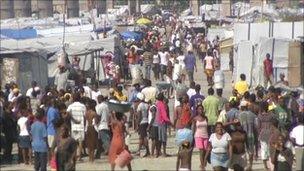Fears rise in Haiti as cholera outbreak spreads
- Published

Experts fear communities in Haiti's capital, like Cite Soleil, may soon be overrun with cholera
A cholera outbreak has now claimed more than 540 lives in Haiti, amid concerns the disease may be spreading to the capital, Port-au-Prince. The ≥…»ÀøÏ ÷'s Laura Trevelyan investigates the impact of the disease on a country still reeling from January's earthquake.
Outside the hospital in Cite Soleil, I meet Jonathan, holding his stomach while leaning against a wall.
"I have watery diarrhoea, and nine people from my neighbourhood have died from cholera," he says.
Next to Jonathan is Lilera, who is suffering from vomiting and diarrhoea - the symptoms of cholera. "People have been dying where I live too," she says in a matter-of-fact manner.
"I know we are supposed to treat the water and wash our hands, but it is filthy where my home is," Lilera adds.
Lilera and Jonathan do not count yet in the official statistics on cholera. It will take at least two days for their samples to be tested for the disease.
But, like Lilera and Jonathan, 114 of the 120 people now suspected of having cholera live in Cite Soleil.
The ocean-front slum on the edge of Port-au-Prince is notoriously cramped and dirty, with many residents living without toilets and clean water.
And because of Cite Soleil's reputation for gang violence, only a few aid agencies work here - so there aren't ready supplies of hand sanitizer and water purification tablets.
Aid agencies acknowledge that those living in the earthquake survivor camps are probably better off than people in Cite Soleil - so now the worry is how to stop cholera from spreading in the community.
"It [the cholera outbreak] will explode now," Dr Kara Gibson of the charity Samaritan's Purse says.
Dr Gibson worries the hospital in Cite Soleil will be overwhelmed and unable to cope with all the cases.
Spreading the disease
Dealing with the cholera epidemic has been further complicated in this already-damaged country by last week's hurricane.
Grand Saline is a coastal town north of Saint Marc, where 14 have died because of the infection
Flooding could help spread the disease farther across the country.
Cholera can incubate in pools of stagnant water and spread through contaminated water and the faeces of those infected.
Hand-washing and other basic sanitation measures can stop the spread of the infection, but those in slums and in flooded areas often do not have access to clean water or toilets.
On board a UN helicopter flying north to deliver cholera prevention packs, I see how much flooding there has been throughout the region.
Grand Saline is a coastal town north of Saint Marc, the epicentre of the outbreak where 14 have died from the infection.
The road to the town has been blocked, and people are trapped by the flooding.
Even more alarmingly, the river that burst its banks is a tributary of the Artibonite, believed to have been contaminated by cholera.
Kits to prevent the infection including soap, chlorine and water purification tablets are delivered to the people.
"We need food," they say. That delivery comes the next day.
The trip north suggests that the outbreak may be greater than official statistics suggest.
Peacekeepers blamed
The epidemic began in October when the Artibonite River north of Port-au-Prince somehow became infected.
The death toll from the cholera outbreak in Haiti has climbed to more than 500
Rice workers next to the river were the first to get the disease - though it is not clear how they contracted it.
The US Centers for Disease Control has identified the strain of cholera as most closely resembling one from South Asia.
Local people have pointed the finger at UN peacekeepers from Nepal, where cholera is endemic. But the Nepalese Army has insisted that the peacekeepers tested negative for cholera before they left for their deployment.
Pointing the finger of blame at the Nepalese is tricky for the Haitian government, which relies on the UN to provide logistical support.
And it is complex for the UN, which through its various agencies is trying to manage the camps for earthquake survivors, organise humanitarian aid and support the Haitian government - at the same time as its peacekeepers are accused of spreading the disease.
This has been such a turbulent year for Haiti, a year when families have suffered so much - from the earthquake to the cholera outbreak.
Ask people how they can endure such a set of catastrophes, and the answer often heard is that the people of Haiti "take comfort from God".
- Published9 November 2010
- Published9 November 2010
- Published7 November 2010
- Published6 November 2010